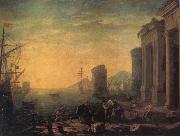Wholesale Oil Painting No Minimum |
|||||||||||
|
|
|||||||||||

|
|||||||||||
|
|
|
||||||||
GILLOT, ClaudeFrench Painter, 1673-1722 French draughtsman, printmaker and painter. He was the son of an embroiderer and painter of ornaments, who doubtless trained him before he entered the Paris studio of Jean-Baptiste Corneille about 1690; there he learnt to paint and etch. In 1710 he was approved by the Academie Royale; he was received as a history painter five years later, on presentation of the Nailing of Christ to the Cross . Although he painted other elevated subjects, including a Death of the Virgin (1715; untraced) for his native Langres, he was most active as a draughtsman and printmaker specializing in theatre and genre scenes, as well as bacchanals and designs for decorations. Gillot's principal source of inspiration was the popular theatre; he is said to have run a puppet theatre, to have written plays and once to have been in charge of sets, machinery and costume for the opera. This interest was to have a profound effect on the art of his principal pupil, Antoine Watteau |
||||||||
|
|
||||||||
Morning in the Harbour
Morning in the Harbour Painting ID:: 34287 |
mk91
1640s
Oil on canvas
74x97
mk91 1640s Oil on canvas 74x97 |
|||||||
|
|
||||||||
|
Claude Lorrain French 1600-1682 Claude Lorrain Galleries In Rome, not until the mid-17th century were landscapes deemed fit for serious painting. Northern Europeans, such as the Germans Elsheimer and Brill, had made such views pre-eminent in some of their paintings (as well as Da Vinci in his private drawings or Baldassarre Peruzzi in his decorative frescoes of vedute); but not until Annibale Carracci and his pupil Domenichino do we see landscape become the focus of a canvas by a major Italian artist. Even with the latter two, as with Lorrain, the stated themes of the paintings were mythic or religious. Landscape as a subject was distinctly unclassical and secular. The former quality was not consonant with Renaissance art, which boasted its rivalry with the work of the ancients. The second quality had less public patronage in Counter-Reformation Rome, which prized subjects worthy of "high painting," typically religious or mythic scenes. Pure landscape, like pure still-life or genre painting, reflected an aesthetic viewpoint regarded as lacking in moral seriousness. Rome, the theological and philosophical center of 17th century Italian art, was not quite ready for such a break with tradition. In this matter of the importance of landscape, Lorrain was prescient. Living in a pre-Romantic era, he did not depict those uninhabited panoramas that were to be esteemed in later centuries, such as with Salvatore Rosa. He painted a pastoral world of fields and valleys not distant from castles and towns. If the ocean horizon is represented, it is from the setting of a busy port. Perhaps to feed the public need for paintings with noble themes, his pictures include demigods, heroes and saints, even though his abundant drawings and sketchbooks prove that he was more interested in scenography. Lorrain was described as kind to his pupils and hard-working; keenly observant, but an unlettered man until his death. The painter Joachim von Sandrart is an authority for Claude's life (Academia Artis Pictoriae, 1683); Baldinucci, who obtained information from some of Claude's immediate survivors, relates various incidents to a different effect (Notizie dei professoni del disegno). John Constable described Claude Lorrain as "the most perfect landscape painter the world ever saw", and declared that in Claude??s landscape "all is lovely ?C all amiable ?C all is amenity and repose; the calm sunshine of the heart" Morning in the Harbour mk159 c.1649 Oil on canvas 97.5x120cm |
||||||||
|
|
||||||||
|
Prev Next
|
||||||||
|
|
||||||||
|
Related Paintings to Claude Lorrain :. |
||||||||
|
|
||||||||
|
CONTACT US |

